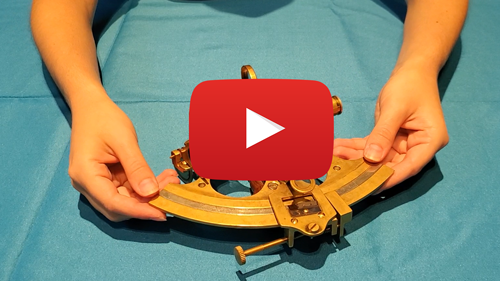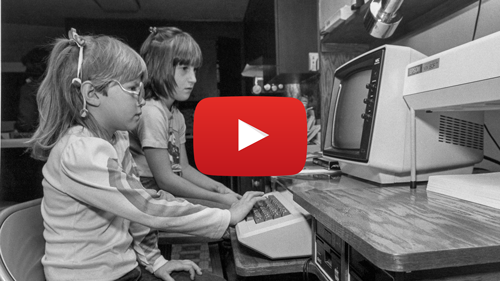Photo: Daniel Sheehan
Education at MOHAI
MOHAI’s wide range of hands-on, educational programs make local history come alive for students at every grade level. Diverse offerings include on-site museum field trips, off-site Portable Museum rentals, and digital experiences, with scholarship funding support available for those that qualify.
At the Museum
Come to MOHAI for a hands-on experience that students will always remember. At the museum, classes explore exhibits through self-guided activities and uniquely themed inquiry-based programs led by MOHAI educators.
MOHAI’s highly facilitated, hands-on field trip programs use authentic historic materials to promote teamwork, creativity, communication, visual literacy, critical thinking, observation, and problem-solving skills. All guided programs support Washington’s educational standards, including Essential Academic Learning Requirements (EALRs), Common Core, and 21st Century Skills.
MOHAI’s field trip calendar books up quickly—be sure to make a reservation early. Reservations are required for all youth and student groups coming to the museum.
Field Trips
There are a limited number of field trips available for the 2023/2024 school year. If you are interested in requesting a winter or spring field trip, please submit a reservation request below.
We will open for 2024/2025 field trip reservations on April 1, 2024.
Requesting a Field Trip Reservation
Reservations are required for all youth and student groups coming to the museum.
Visits must be booked at least two weeks in advance to guarantee availability.
After you submit a field trip request, you will receive a confirmation email within 3 weeks. In the event that we cannot accommodate your request, we will contact you to make alternative arrangements.
Scholarships and bus reimbursement funds are available to schools that qualify.
For program descriptions, costs, and availability, please review the information below.
-
Self-Guided School Year Explorations
A self-guided field trip is ideal for groups who wish to bring their own activity and explore at their own pace.
-
MOHAI educators greet groups, offer storage for lunches and coats, provide a quick orientation to the space, and are available to answer questions throughout the visit. MOHAI provides grade banded scavenger hunts for use in small, chaperone-led groups. Teachers may elect to design and bring their own activity. Activities are required for self-guided field trips. View additional educator materials for activity ideas.
Grade Level: Pre-K—Grade 12
Price: $50 per group of 10-30 students
Duration: 2 hours. If you are seeking alternative arrangements, please note in your booking form and our coordinator will contact you.
Please be aware that our reservation window does not account for lunch. Your school is welcomed to eat lunch in the park before or after the field trip at your leisure.
Available: September 21, 2023-December 15, 2023, January 16, 2024-June 2024; Monday-Friday, 10 am-4:30 pm
Accommodations: 3 classes, up to 90 students; one chaperone for every six students required, up to one chaperone for every two students are included in the field trip fee (additional chaperones must pay regular admission rates).
-
Creating Our Community
This guided program offers students an in-depth look at the working life of early Puget Sound residents.
-
Through role-playing activities and hands-on artifact analysis, students experience the daily routines of various workers while learning how these occupations work together within a community, both in history and today. Visit includes additional self-guided gallery time.
Grade Level: K–Grade 2
Price: $200 per group of 10-30 students
Duration: 1 hour per group
Available: September 21, 2023-December 15, 2023, January 16, 2024-June 2024; Monday-Friday, 10 am-2 pm
Accommodations: 30 students max per program, up to 3 programs (90 students) per day; one chaperone for every six students required, up to one chaperone for every two students are included in the field trip fee (additional chaperones must pay regular admission rates).
-
Cracking the History Code: Salish Stories
A part of the Cracking the History Code series, Salish Stories focuses on the Coast Salish communities of the Puget Sound.
-
Students play a game that involves listening to stories, looking at historic photos, and handling artifacts crafted by local artists to discover the culture, history, language, and lifeways of Puget Sound’s first peoples. Visit includes additional self-guided gallery time.
Grade Level: Grades 3-5
Price: $200 per group of 10-30 students
Duration: 1 hour per group
Available: September 21, 2023-December 15, 2023, January 16, 2024-June 2024; Monday-Friday, 10 am-2 pm
Accommodations: 30 students max per program, up to 3 programs (90 students) per day; one chaperone for every six students required, up to one chaperone for every two students are included in the field trip fee (additional chaperones must pay regular admission rates).
-
Cracking the History Code: Settling Around the Sound
A part of the Cracking the History Code series, this guided program engages students in a game that uses real artifacts, photos, and documents to uncover historical events.
-
Students investigate the challenges that faced five different groups of people traveling to or living in the Puget Sound region during its early history. Visit includes additional self-guided gallery time.
Grade Level: Grades 3-5
Price: $200 per group of 10-30 students
Duration: 1 hour per group
Available: September 21, 2023-December 15, 2023, January 16, 2024-June 2024; Monday-Friday, 10 am-2 pm
Accommodations: 30 students max per program, up to 3 programs (90 students) per day; one chaperone for every six students required, up to one chaperone for every two students are included in the field trip fee (additional chaperones must pay regular admission rates).
-
Hands on History
Hands on History is a new program offering a flexible field trip option designed to engage students wherever they are on their learning journey. This program was designed with mixed-age and mixed-skill classrooms in mind but is adaptable to fit a variety of classroom structures and student needs.
-
At the heart of the program is a facilitated, hands-on primary source and artifact investigation, with a selection of activities chosen by MOHAI Educators to tailor the experience to specifically fit your group’s needs.
Choose a topic:
- Settling Around the Sound (Grades 2–12) – Students will investigate primary sources reflecting different groups of people traveling to or living in the Puget Sound region during the 1800s. Students then use their findings to reveal what daily life was like in the Puget Sound in this time period.
- People – Coast Salish peoples, explorers, traders, Oregon trail, farming/settlement.
- Seattle Innovation & Industries (Grades 4–12) – Students will investigate primary sources from five key Washington industries that have a strong history of innovation and an outsized impact on the history and economy of the region. Through exploring methods of problem solving within these industries, students will reflect on the skills required to innovate successfully, such as creativity, risk, collaboration, and observation.
- Industries – fishing, aviation, medical, computers, logging.
- Community Snapshots: Photographs of Al Smith (Grades 2–12) – Students will explore the photographs of Al Smith plus additional primary sources to explore life in the Central District in the mid-20th century. Students will look at examples of the people and places that make up a community, consider how points of view influences historic documentation, and examine the ways people shape and are shaped by their communities.
- Themes focus on different aspects of a local community – family and friends, gathering places, businesses.
After receiving your reservation request, we will contact you with questions to help MOHAI’s educators pick the best activities and resources for your group.
Grade Level: Grades 2-12
Price: $225 per group of 10-30 students
Duration: 1 hour per group
Available: September 21, 2023-December 15, 2023, January 16, 2024-June 2024; Monday-Friday, 10 am-2 pm
Accommodations: 30 students maximum per program, up to 2 programs (60 students) per day; one chaperone for every six students required, up to one chaperone for every two students maximum included under the group rate are included in the field trip fee (additional chaperones must pay regular museum admission rates).
Due to the individualized nature of this program, booking is required 4 weeks minimum ahead of field trip date.
- Settling Around the Sound (Grades 2–12) – Students will investigate primary sources reflecting different groups of people traveling to or living in the Puget Sound region during the 1800s. Students then use their findings to reveal what daily life was like in the Puget Sound in this time period.
-
Self-Guided Summer Field Trips
A self-guided field trip is ideal for groups who wish to explore at their own pace.
-
MOHAI staff greet groups, offer storage for lunches and coats, provide a quick orientation to the museum, and are available to answer questions throughout the visit. MOHAI provides grade banded scavenger hunts for use in small, chaperone-led groups. Activities are required for self-guided field trips.
Grade Level: Pre-K–Grade 12
Price: $50 per group of 10-30 students
Duration: 2 hours. If you are seeking alternative arrangements, please note in your booking form and our coordinator will contact you.
Please be aware that our reservation window does not account for lunch. Your school is welcome to eat lunch in the park before or after the field trip at your leisure.
Available: June 20-August 31, 2024, Monday-Friday, 10 am-2 pm
Accommodations: Up to 60 students; one chaperone for every six students required, up to one chaperone for every two students (additional chaperones must pay regular admission rates) are included in the field trip fee (additional chaperones must pay regular admission rates).
-
Homeschool Group Information
MOHAI education is excited to host homeschool cooperatives, unschoolers, ALE, and similar mixed-age/grade groups. We do require reservations for all groups.
-
Download our Homeschool Group Information pdf for answers to frequently asked questions. Please feel free to reach out to education@mohai.org with specific questions.
Bus Parking Information
Find out where to park buses and ways to navigate South Lake Union.Learn More
In the Classroom
Portable Museum Programs
About the Portable Museum Program
MOHAI’s Portable Museum Program provides hands-on learning to students using primary source materials, as well as standards supporting lesson plans and additional content for educators. Portable Museum Trunks and Kits, as well as Digital Trunks, can be booked alone or paired with a MOHAI field trip.
Portable Museum Trunks and Kits contain artifacts, historical photographs, documents, slideshows, digital media, and an extensive Teacher’s Manual with lesson plans and activities that can be modified to meet individual class needs.
Trunks cover more expansive content areas and include two weeks’ worth of lesson plans. Kits include fewer, more targeted lessons focused on particular topics. Digital Trunks are purely digital files and materials.
Lesson plans target specific grade levels depending on the trunk or kit topic, but contents are suitable for all ages of K-12 students and materials can be adapted to any grade level.
Requesting a Portable Museum reservation:
Portable Museum rentals must be scheduled a minimum of two weeks in advance. Late change and cancellation fees apply.
Renters are responsible for picking up and returning the Portable Museum to MOHAI.
Museum Trunks
-
Coast Salish Culture
Explore the rich cultural history of the Coast Salish people of the Pacific Northwest, through art, stories, historic events, and the objects of daily life.
-
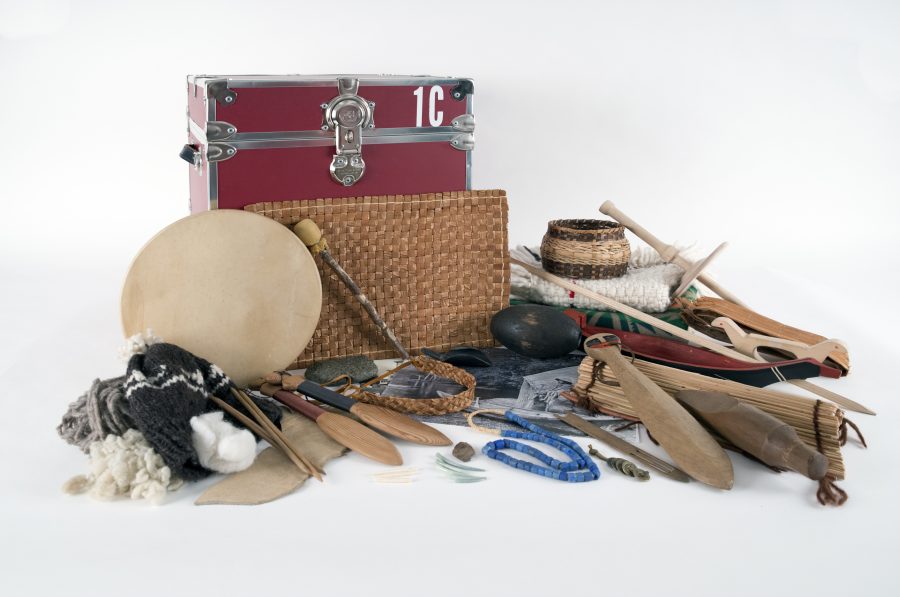
Coast Salish communities have a unique and deep history in the Pacific Northwest. Through independent and collaborative primary source investigations, students learn about Coast Salish life in past times and today.
Recommended Grade Level: Grade 5
Size: 18″ x 18″ x 20″
Cost: $50 for two-week rental; $25 per additional week. Late returns are subject to a fine.
Sample Trunk artifacts:
- Blue glass trade bead
- Bone awl
- Handwoven blanket
- Western cedar bark
- Fish club
-
Exploration and Trade
Explorers from around the world came to the Pacific Northwest to gather information, claim lands, and trade. Students learn who they were, how they traveled, and what they traded.
-
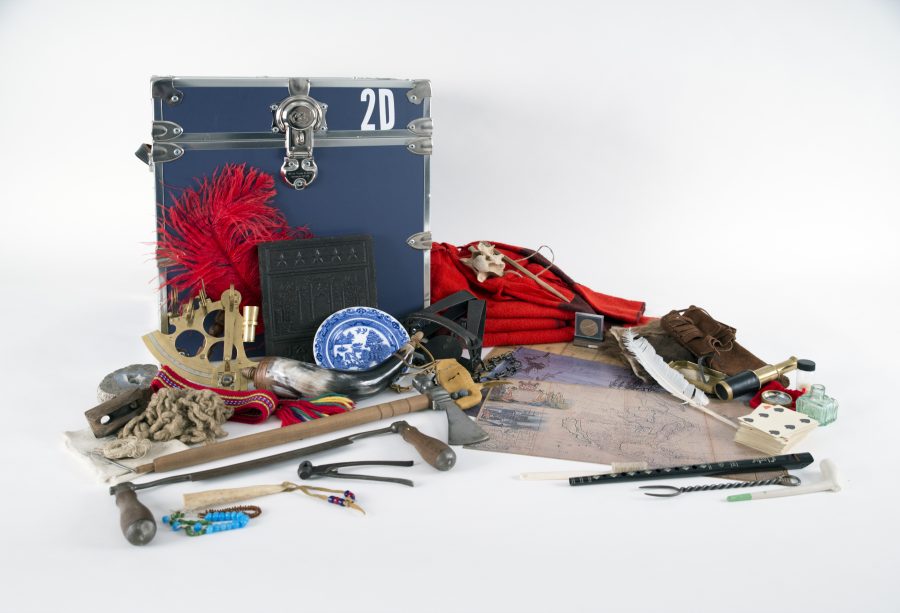
Explorers embarked on journeys to chart territory and trade for valuable items. Students learn about who notable explorers were, what drew them to the Pacific Northwest, and how they navigated through waterways and over land. Primary resources guide collaborative investigations that challenge students to see a new perspective and engage in hands-on learning.
Recommended Grade Level: Grade 4
Size: 18″ x 18″ x 20″
Cost: $50 for two-week rental: $25 per additional week. Late returns are subject to a fine.
Sample trunk artifacts:
- Peace and friendship medal
- River otter fur
- Sextant
- Flint and steel with tinderbox
- Tea brick
-
Settlement in Puget Sound
The Oregon Trail brought many people to the Pacific Northwest. Learn about the daily life of early settlers and the reasons that ultimately brought them out West.
-
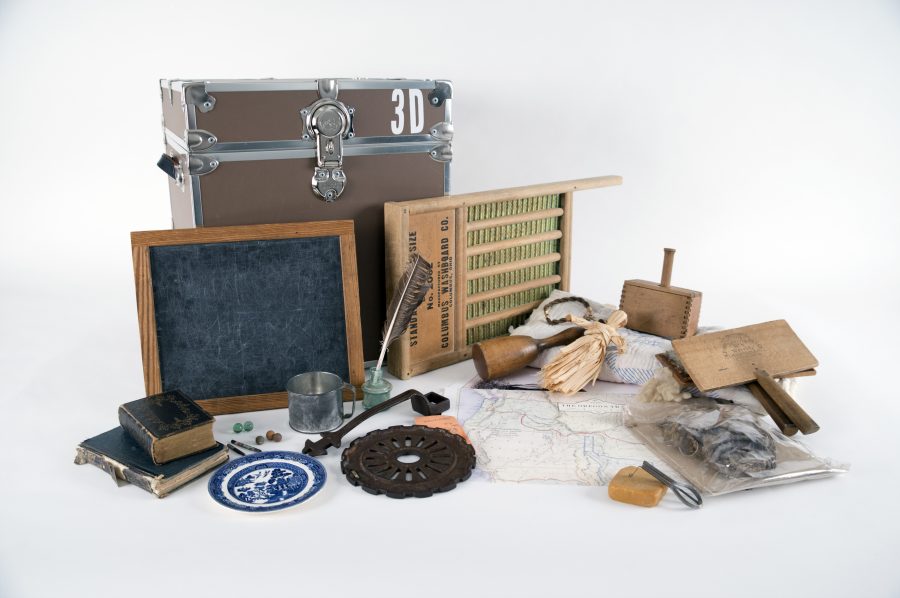
Settlers who came to the Pacific Northwest along the Oregon Trail made the journey for many different reasons. Students use artifacts and other primary resources to study the people that made the journey, what motivated them, and what day-to-day life was like. In addition, students discuss the complex early encounters between settlers and the Native American communities already living there.
Recommended Grade Level: Grade 4
Size: 18″ x 18″ x 20″
Cost: $50 for two-week rental; $25 per additional week. Late returns are subject to a fine.
Sample Trunk artifacts:
- Cornhusk oil
- Buffalo chip
- Butter mold
- Seed spreader disk
- Washboard
-
The Years of Growth and Change
The Pacific Northwest experienced significant growth and change between the years 1870 and 1910. Students uncover innovations in daily life and industry.
-
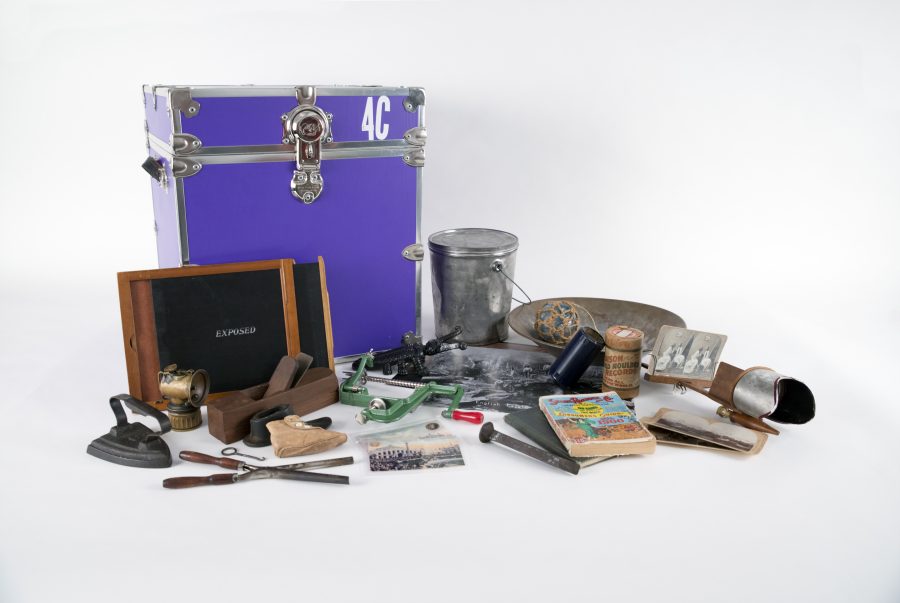
Daily life changed as innovations were made in household chores, food, homes, and transportation. Students dive into an interactive investigation of day-to-day life during these years, comparing and contrasting the changes that shaped the growth of this region.
Recommended Grade Level: Grade 7
Size: 18″ x 18″ x 20″
Cost: $50 for two-week rental: $25 per additional week. Late returns are subject to a fine.
Sample Trunk artifacts:
- Stereoscope
- Carbide lantern
- Sears catalog
- Cylinder record
- Railroad spike
-
The WWII Homefront Experience
World War II brought global distress, but how did these events shape Seattle? through artifact investigations, students explore the home-front experience.
-
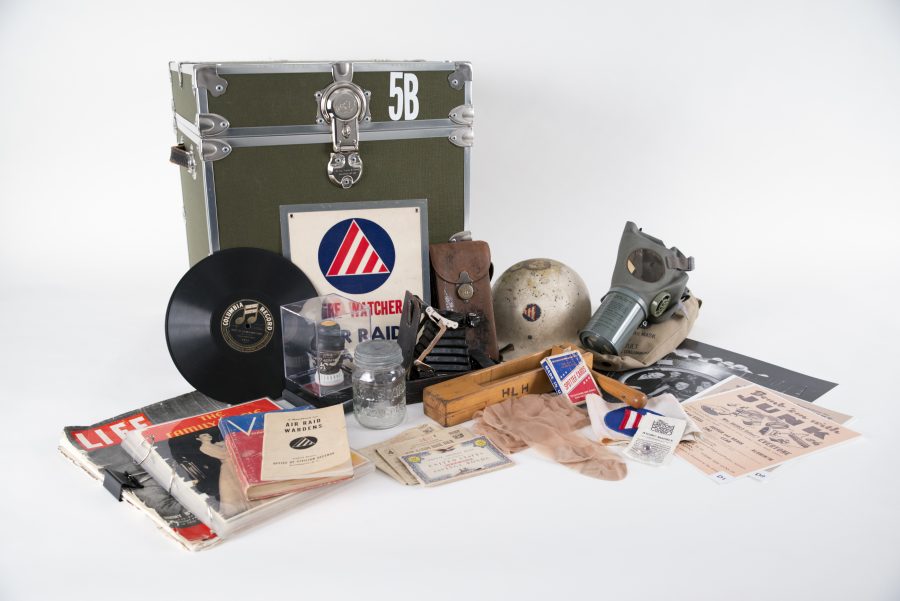
The home-front experience during World War II brought many changes to daily life in the Pacific Northwest. Students use primary resources to investigate workforce changes, the effects of rationing, and how each person was urged to “do their part.” This trunk also includes an introduction to Japanese American Incarceration and recommendations for additional resources on this topic.
Recommended Grade Level: Grade 7
Size: 18″ x18″ x 20″
Cost: $50 for two-week rental; $25 per additional week. Late returns are subject to a fine.
Sample Trunk artifacts:
- Air raid handbook
- Ration and food stamp books
- Blackout lightbulb
- Gas mask
- Life and Family Circle magazines
-
Seattle Innovations
Innovation has defined our region as long as humans have lived in this place. From local tribes utilizing the resources found here to build complex societies, to the modern-day tech boom, people have been working to meet or exceed the needs of their community. As Seattle has become more networked, local innovations have made global impacts. What is it about this place that creates the environment necessary for such an outsized amount of amount of innovation to occur?
-
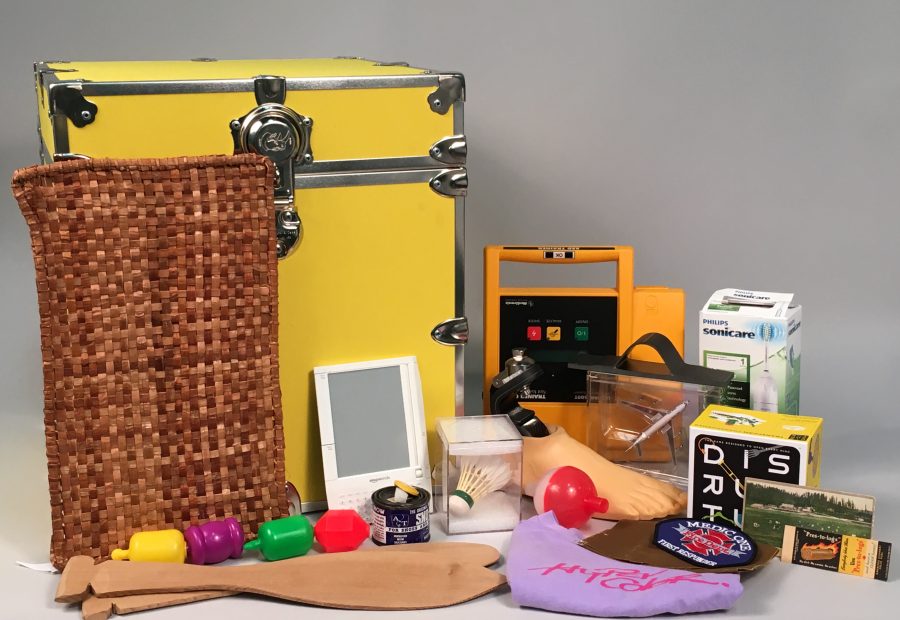
Students will explore the tradition of innovation in our region, see themselves as innovators, and gain skills necessary to solving the next set of challenges that we face.
Recommended Grade Level: Grades 4-5
Size: 18″ x 18″ x 20″
Cost: $50 for two-week rental: $25 per additional week. Late returns are subject to a fine.
Sample Trunk artifacts:
- Seattle Foot
- Coast Salish Canoe Paddle Models
- Hypercolor T-Shirt
- Carbon Fiber Composite Material
- Cedar Bark Mat
Museum Kits
-
Discovering Seattle Stories Early Learning Kit
Discover the history of Seattle through the Great Seattle Fire in 1889 using artifacts and an interactive story.
-
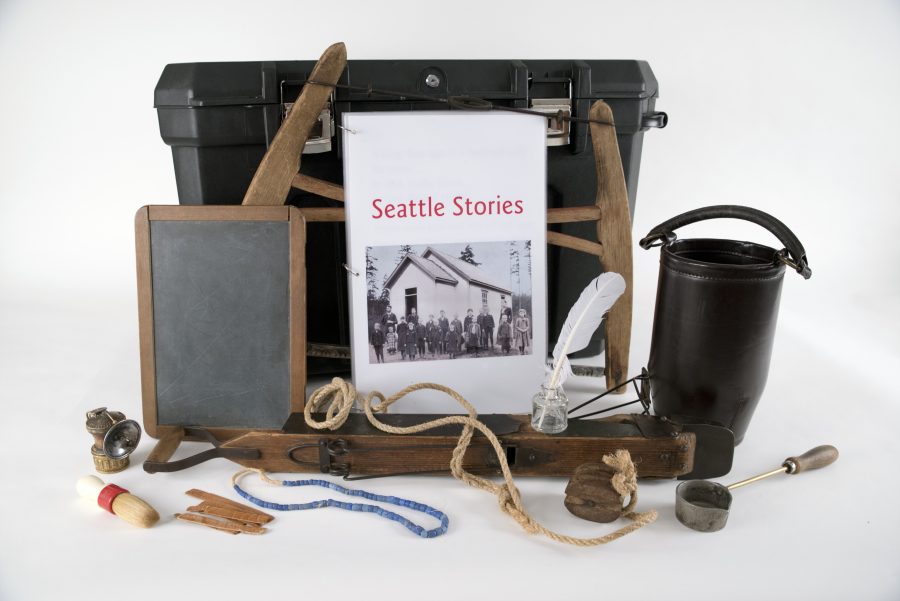
This Kit introduces students to basic artifact analysis and tells the history of Seattle using objects from the era. Students make and share their objects as part of an interactive story and learn the history of Seattle from settlement through the Great Seattle Fire. This lesson takes approximately 40 minutes and includes additional extension activities using the artifacts.
Recommended Grade Level: Pre-K—Grade 1
Size: 23.5″ x 35″ x 23.5″
Cost: $30 for two-week rental; $15 per additional week. Late returns are subject to a fine.
-
The Years of Growth & Change Dig Deep CBA Kit
The years from 1870-1910 marked a time of change in the Puget Sound region. Discover the innovations and industries that altered the way Washington residents lived their everyday lives.
-
Use primary sources to dig deeper into years of rapid growth and change in Seattle’s past, and learn what daily life was like for early settlers during the time of railroad expansion, the growth of many industries, and the Great Seattle Fire. This kit is a smaller variation on the Years of Growth & Change Trunk, and was developed in partnership with the Bellevue School District and supports the Dig Deep Classroom-Based Assessment. Kit is available to all school districts.
Recommended Grade Level: Grade 4
Size: 15″ x 18″ x 11″
Cost: $30 for two-week rental; $15 per additional week. Late returns are subject to a fine.
-
Century 21 Exposition Kit
Uncover the history and themes of Seattle’s 1962 World’s Fair as it relates to both the city’s past and future using images, events, and objects from this historic events.
-
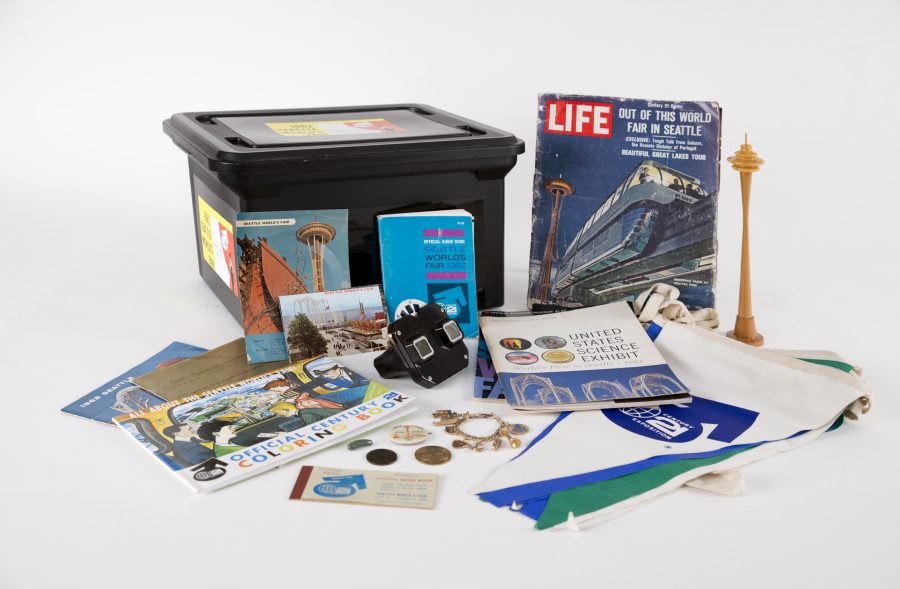
The 1962 World’s Fair was a pivotal turning point for Seattle as it gained global recognition and made iconic changes to the physical and cultural landscape of the city. Students analyze the history, context, and broader cultural themes of this significant event, as well as the differences between it and the Alaska-Yukon-Pacific Exposition of 1909.
Recommended Grade Level: Grades 5-12
Size: 15″ x 18″ x 11″
Cost: $30 for two-week rental; $15 per additional week. Late returns are subject to a fine.
Digital Museum Trunks
About Digital Museum Trunks: MOHAI’s four most popular Portable Museum trunk topics have been adapted for a purely digital experience. Digital Trunks contain lesson plans, activities, and primary sources such as documents, maps, and photographs. They can be adapted for use in-person or online learning settings.
Digital Museum Trunks are available free of charge.
Requesting a Digital Museum Trunk: Request access through webforms linked in each trunk below. Once a request has been processed, you will receive a link to the Digital Trunk files and will have access to the content for 6 months.
-
Exploration and Trade
Explorers from around the world came to the Pacific Northwest to gather information, claim lands, and trade. Students learn who they were, how they traveled, and what they traded.
-
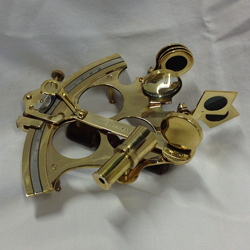
Explorers embarked on journeys to chart territory and trade for valuable items. Students learn about what drew these explorers to the Pacific Northwest, and how they navigated through waterways and over land.
Recommended Grade Level: Grade 4
This trunk explores:
- Mapping & nautical exploration
- Overland and U.S. exploration
- Fur trade & trading companies
All trunks include:
- Slideshow of historic images, documents, and artifacts with item descriptions
- Background information and resources
- Lesson plans for primary source analysis
- Supporting handouts and activities
-
Settlement in Puget Sound
The Oregon Trail brought many people to the Pacific Northwest. Learn about the daily life of early settlers and the reasons that ultimately brought them out West.
-
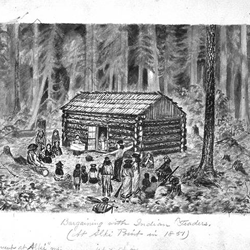
Settlers who came to the Pacific Northwest along the Oregon Trail made the journey for many different reasons. Students use primary resources to study the people that made the journey, what motivated them, and what day-to-day life was like.
Recommended Grade Level: Grade 4
This trunk explores:
- Moving west on the Oregon Trail
- Early settlements
- Treaties & reservations
All trunks include:
- Slideshow of historic images, documents, and artifacts with item descriptions
- Background information and resources
- Lesson plans for primary source analysis
- Supporting handouts and activities
-
Coast Salish Culture
Explore the rich cultural history of the Coast Salish people of the Pacific Northwest, through art, stories, historic events, and the objects of daily life.
-
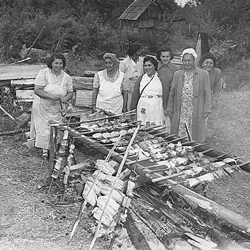
Coast Salish communities have a unique and deep history in the Pacific Northwest. Through independent and collaborative primary source investigations, students learn about Coast Salish life in past times and today.
Recommended Grade Level: Grade 5
This trunk explores:
- Geography & natural resources
- Art & material culture
- Storytelling
- Treaties & sovereignty
All trunks include:
- Slideshow of historic images, documents, and artifacts with item descriptions
- Background information and resources
- Lesson plans for primary source analysis
- Supporting handouts and activities
-
Years of Growth and Change
The Puget Sound region experienced significant growth and change between the years 1870 and 1910. Increased railroad access to the Pacific Northwest resulted in drastic changes to industry, population, and landscape as Washington entered statehood and Seattle became an industrialized city.
-
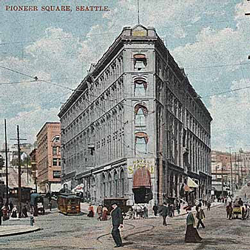
At the same time, technological innovations in transportation, entertainment, and communication drastically altered urban life. By looking at primary sources, students uncover some of the many factors that led to immense changes in this period and how they impacted daily life in Seattle.
Recommended Grade Level: Grade 7
This trunk explores:
- WA territory, statehood, and urban development
- Early industries and innovations
- Immigration, migration, and community
All trunks include:
- Slideshow of historic images, documents, and artifacts with item descriptions
- Background information and resources
- Lesson plans for primary source analysis
- Supporting handouts and activities
Activities, Curriculum, and Resources
Bite-sized digital history activities
Explore bite-sized history activities! Use our teen-created podcast, Rainy Day History, as a starting point to look at muddy and complicated waters of Seattle's past; watch a MOHAI Minute and create engaging activities; or go back in time and explore MOHAI's past exhibits. We welcome your thoughts and feedback on these activities! Email your thoughts and suggestions to education@mohai.org.Learn More
Online Curriculum
Use history curricula made by MOHAI educators for the classroom.Learn More
Education FAQ
Find answers to frequently asked questions about our Education programs.Learn More
Primary Source Analysis
Primary Sources such as objects, documents, or photographs provide a first-hand account or an event or time. At MOHAI, we use primary source investigation and object-based inquiry to create multi-disciplinary learning experiences that stretch students’ critical and creative thinking skills. Below are a variety of fun ways to bring the MOHAI collection and object-based inquiry to your students.
-
Collection Connections: Objects in Question Videos
This video series is all about what we can learn about historic items, just by looking at them! Click here to view the full playlist of available Collection Connections videos.
-
Practice making observations and inferences with your students with these bite-sized history lessons that highlight different objects in our collection. New videos will be shared monthly – let us know what subjects or objects you and your students might be interested in!
Click on the links below to view:
Collection Connections – Early Northwest Explorers (5:58)
Collection Connections – Coast Salish Cedar Weaving (5:39)
Collection Connections – Early American Settlers (6:09)
Collection Connections – Years of Growth & Change (7:15)
Collection Connections – Seattle Jazz (7:56)
Collection Connections – The Great Seattle Fire (7:28)
Collection Connections – Building & Construction (7:14)
Collection Connections – WA Industries (6:16)
Collection Connections – Traditional Coast Salish Homes (5:49)
Collection Connections – Music As Entertainment (7:33)
Collection Connections – Railroads (7:02)
Collection Connections – Coal Mining (7:52)
Collection Connections – 1962 Seattle World’s Fair (9:21)
Collection Connections – WWII Home Front (8:59)
Collection Connections – Community Health & Safety (9:04)
Collection Connections – Coast Salish Wool Weaving (8:40)
Collection Connections – Aviation Innovations (10:02)
Collection Connections – Seattle Style (8:10)
Collection Connections – B-1 (5:41)
Collection Connections – Wawona (9:53)
We want to hear your thoughts and feedback! What topics and objects should we explore next? Email your thoughts and suggestions to education@mohai.org.
-
Introduction to Primary Source Analysis
Use these questions as a starting point to encourage students’ historical thinking by asking what they see, think, and wonder about objects in our collection.
-
MOHAI Online Collection Galleries and Suggested Activities
Did you know that you can access an extensive part of MOHAI’s collection online? There is a lot to explore, so we have specifically selected items focusing on three themes and created inquiry and creative thinking prompts for student exploration.
-
Educator Workshop: Using the Online Collection
If you can’t bring your students to MOHAI this year, bring our collection to them!
-
Join MOHAI educators as we explore MOHAI’s digitized collection and how you can use it to support remote learning. Learn how to conduct research using MOHAI’s collection, build tools that support object-based inquiry, and create multi-disciplinary learning experiences that stretch students’ critical and creative thinking skills.
Click on the link below to view:
Educator Workshop: Digital Distance Learning (1:06:38)
This is a condensed live recording from our Educator Workshop: Digital Distance Learning.
-
MYA Online Collection Scavenger Hunt
The MOHAI Youth Advisors have designed a scavenger hunt through the MOHAI online collection that familiarizes students with the online collection portal and common search strategies.
-
Designed with high school students in mind, the hunt explores photos of young people getting involved in their community throughout Seattle history. Use it to introduce independent research assignments or to encourage further exploration following an experience with MOHAI.
Youth and Family
Looking for creative ways to learn about history with the young people in your home? Explore and have fun with activities that help inquisitive minds explore our region’s stories.
Scholarships
Each year, over 200 schools from over 30 school districts participate in MOHAI’s school-based education programs. Costs associated with visiting the museum can create barriers for some schools and educational groups, though. MOHAI’s educational scholarships help provide greater access to the museum and the history of the Puget Sound region.
MOHAI offers scholarships to schools and student groups for both field trips and Portable Museum program rentals. The scholarship program serves learners to ensure no student is ever turned away because of financial limitations.
Sign up for the Educator Newsletter
Education Program Supporters
MOHAI’s Education programs are made possible in part by generous grants from the Suquamish Tribe, the Suquamish Foundation, and the Muckleshoot Indian Tribe.
